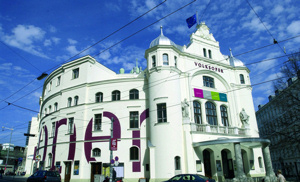The Merry Wives of Windsor
Mo | Tu | We | Th | Fr | Sa | Su |
Comic/fantasy opera by Otto Nicolai
In German language with German surtitles
Ms. Fluth and Ms. Reich, two married ladies, receive love letters from the impoverished nobleman Falstaff at the same time. They decide to teach him a lesson. At the same time, three cavaliers want to marry Anna, the daughter of Ms. Reich: Dr. Cajus, a French beau, is her mother's favourite, but her father prefers the shy Junker Spärlich, and Anna herself is in love with the penniless Fenton. Plenty of material for countless complications and entanglements.
More than 40 years before Verdi, Otto Nicolai and librettist Salomon Hermann Mosenthal used Shakespeare's play The Merry Wives of Windsor for their opera. Was it a romantic comedy the two had in mind, or can we even detect an influence from the revolutionary movements of 1848? Confident bourgeois women taking up the fight with aristocracy?
In any case, if failed ambition is considered one of the driving forces of drama, The Merry Wives of Windsor provides the best example. And in this case it is not gods or fate that cause ambition to fail, it is the women who trim male ambition down to nothing but empty words. The production is in the hands of the highly accomplished Dutch director Nina Spijkers, who has already subjected numerous theatre classics to a critical reading and will be working with set designer and Tony Award winner Rae Smith for her first work at the Volksoper. "I am drawn to stories in which women form a strong community," says Spijkers of her interest in Nicolai's opera.
Synopsis
Act I
Frau Fluth and Frau Reich both receive ardent, albeit bold love letters: identically worded, signed by the same sender: John Falstaff. They vow to pay him back for his audaciousness. Their husbands also discuss matters of the heart. Herr Fluth questions his wife’s fidelity while Herr Reich is busy selecting a future husband for his daughter Anna. The candidates are his favourite Spärlich, while his wife prefers the Frenchman Cajus. Third in contention is penniless Fenton, who vows to love Anna but is dismissed by Reich. The “merry wives” have started their mission and invite Falstaff to a secret date with Frau Fluth. They also inform her husband – by “anonymous” note – of the meeting to cure his jealousy. As expected, Herr Fluth and his entourage arrive to prove his wife’s infidelity. She, however, hid Falstaff in a washing basket and with the help of Frau Reich, manages to get him out of the house.
Act II
After his unexpected bath, Falstaff soon recuperates when receiving a message from Frau Fluth, apologising for the mix-up and inviting him to an erotic adventure once again. Soon after, Herr Fluth, posing as a “Mister Bach” approaches the unsuspecting Falstaff, who tells the “stranger” about the washing basket and a renewed invitation from Frau Fluth.
Spärlich and Cajus both hope for a romantic evening with Anna, but her feelings belong to Fenton alone. She promises her lover to cross her parents’ plan and marry neither of their preferred suitors. Meanwhile, Falstaff has arrived at Frau Fluth’s house, ready for their date. Unexpectedly, Herr Fluth arrives, convinced he will find Falstaff in his wife’s arms. Frau Fluth and Frau Reich, adept to thinking on their feet, swiftly dress Falstaff in a colleague’s dress and parade “her” in front of indignant Herr Fluth.
Act III
The “wives” take pity on their husbands and explain about their plan to dupe Falstaff. In the grand finale, they let his wildest fantasies come true, only to teach him the lesson of his lifetime.
Meanwhile, Anna has taken matters into her own hand, presenting her husband to her parents…
Program and cast
Stage direction: Nina Spijkers
Set design: Rae Smith
Costume design: Jorine van Beek
Choreography: Florian Hurler
Lighting design: Tim van't Hof
Choir director: Roger Díaz-Cajamarca
Volksoper Vienna
Public transport:
Underground line U6
Trams 40, 41, 42
Bus 40A
Stop "Währinger Straße / Volksoper"
A taxi stand is located at Währinger Gürtel.
Parking garages in WIFI and AKH
The Volksoper is Vienna’s main stage for operetta, opera, musicals and ballet, offering sophisticated musical entertainment. Colourful, eclectic and full of vitality, it is the only theatre dedicated to the genre of operetta.
Operetta belongs to Vienna and Vienna installed it at the home of operetta, Volksopera Vienna, which thereupon became the leading operetta house in the world. First class singers, actors and dancers together with a versatile orchestra cunjure up a musical firework display every evening.
Johann Strauss, Franz Lehár, Emmerich Kálmán wrote their world famous beloved melodies for operettas such as “The Fledermaus”, “The Merry Widow” and “The Csárdás Princess”. A visit to at least one of these operettas at the Volksopera Vienna is a must for every visitor to Vienna!
Also performed are operas from the 18th, 19th and 20th centuries, as well as classic musicals and ballet. In addition, the Volksoper has a fifth longstanding and proven speciality: it stages soirées, cabaret and burlesque performances under the name of “Volksoper Spezial”.
In the repertory theatre, which seats 1,337 persons, some 300 performances of around 35 different productions are staged every year between September and June.
Performances: Tu 30 Jul 2024,
Performances: Mo 02 Jun 2025,
Performances: Sa 29 Mar 2025,
Performances: Su 02 Mar 2025,
Performances: Sa 27 Jul 2024,
Performances: Su 13 Oct 2024,

 EN
EN DE
DE IT
IT FR
FR ES
ES RU
RU JP
JP RO
RO
 Seating plan
Seating plan 








